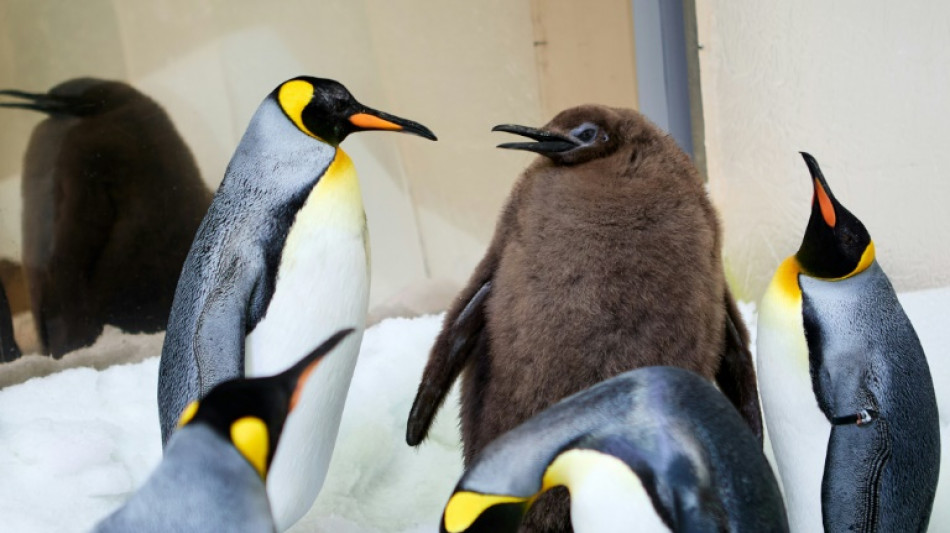
| RYCEF | -0.14% | 7.27 | $ | |
| RBGPF | 0% | 60.5 | $ | |
| CMSC | 0.08% | 23.86 | $ | |
| AZN | 0.8% | 65.875 | $ | |
| SCS | -1.21% | 11.6 | $ | |
| GSK | 0.24% | 33.68 | $ | |
| NGG | 0.26% | 58.65 | $ | |
| RIO | 0.05% | 58.67 | $ | |
| CMSD | -0.06% | 23.545 | $ | |
| VOD | -1.02% | 8.305 | $ | |
| BCE | -2.07% | 22.69 | $ | |
| BTI | -0.6% | 36.025 | $ | |
| RELX | -0.55% | 45.22 | $ | |
| BP | -0.69% | 28.405 | $ | |
| BCC | -0.23% | 122.465 | $ | |
| JRI | 0.12% | 12.075 | $ |

Hefty Australian penguin chick 'Pesto' becomes star
Pesto the penguin towers over the colony at his Australian aquarium home, a fluffy brown furball impossible to miss as he waddles across the ice.
The nine-month-old king penguin chick has shot to fame for his hefty weight of 23.5 kilogrammes (51.8 pounds) -- the size of an overstuffed suitcase.
Pesto already weighs more than his parents Tango and Hudson combined, who tip the scales at about 11 kilogrammes each.
And with a healthy diet of up to 25 fish a day, Pesto's rotund frame will only continue to grow, senior penguin keeper Emily Thornton told AFP.
Thornton said because Pesto is so "food orientated", just keeping him still on the scales to clock his weight can be challenging.
He is already the largest penguin that the Sea Life Melbourne aquarium has seen.
Pesto's coat is mostly "dense" feathers, Thornton said, which penguin chicks require to keep warm against freezing Antarctic temperatures.
Despite his fish diet, these feathers smell like corn chips, Thornton added.
Genetics also play a part -- his ancestors were some of the biggest and oldest penguins the aquarium has housed.
"He is really healthy," Thornton said, adding that "chicks can get bigger than him" in the wild.
Soon, Pesto will shed his fluffy down as he develops his adult feathers, giving him a burst of yellow on his head and cheeks, and a black and white tuxedo.
"That process is energy draining and his appetite will reduce a lot," Thornton said.
King penguins are found in Antarctica and their population remains fairly stable, with about 1.6 million breeding pairs.
During the 19th and 20th centuries, king penguin populations were almost wiped out because they were heavily hunted for their meat, oil and blubber.
X.Maes--JdB



